Don't wanna be here? Send us removal request.
Text
Immigration Programs for you to immigrate to Canada

Are you dreaming of starting a new chapter of your life in the beautiful land of Canada? Well, you're not alone! Canada is known for its stunning landscapes, friendly people, and diverse opportunities. But how do you make that dream a reality? Fear not! Canada offers various Canada Immigration Programs designed to welcome newcomers like you. Let's explore some of the easiest and most accessible pathways to immigrate to Canada.
Express Entry System:
Think of Express Entry as your fast track to Canada. It's an online system that manages applications for three major economic immigration programs:
Federal Skilled Worker Program
Federal Skilled Trades Program
Canadian Experience Class
To apply through Express Entry, you need to create an online profile and submit your credentials, including your education, work experience, language proficiency, and other relevant details. Based on a comprehensive ranking system, you'll be given a score, and candidates with the highest scores are invited to apply for permanent residency.
Provincial Nominee Programs (PNPs)
Each Canadian province and territory, except for Quebec, has its own PNP. These programs are tailored to address specific regional labor market needs. Through PNPs, provinces nominate individuals who have the skills, experience, or connections to contribute to their local economy. To apply, you must meet the eligibility criteria set by the province or territory you're interested in.
Atlantic Immigration Pilot
If you're eyeing the maritime provinces of Nova Scotia, New Brunswick, Prince Edward Island, or Newfoundland and Labrador, the Atlantic Immigration Pilot could be your ticket. This employer-driven program aims to fill labor gaps in the Atlantic region by facilitating the hiring of skilled workers and international graduates. To qualify, you need a valid job offer from a designated employer in one of the participating provinces.
Family Sponsorship
Do you have a family member living in Canada who's willing to sponsor you? If so, you might be eligible for family sponsorship. Canadian citizens and permanent residents can sponsor their spouse, common-law partner, dependent children, parents, or grandparents for permanent residency. This pathway fosters family reunification and support.
Start-Up Visa Program
Are you an entrepreneur with an innovative business idea? The Start-Up Visa Program could be your avenue to Canada. This program targets entrepreneurs who can contribute to the Canadian economy by launching a start-up venture that creates jobs and drives growth. To qualify, you need support from a designated organization and meet certain eligibility criteria.
Caregiver Program
If you have experience caring for children, the elderly, or individuals with medical needs, the Caregiver Program might be suitable for you. This program provides pathways for caregivers to obtain permanent residency in Canada, acknowledging their valuable contributions to Canadian families.
International Experience Canada (IEC)
Designed for youth aged 18-35 from participating countries, the IEC program offers opportunities for temporary work permits, allowing individuals to gain valuable international experience while exploring Canada's vibrant culture and lifestyle.
Before embarking on your Canada Immigration Programs journey, it's essential to thoroughly research and understand the requirements of each program. Consider consulting with immigration experts or legal professionals to ensure you're on the right path. With determination, patience, and proper guidance, your Canadian dream can become a reality sooner than you think!
0 notes
Text
5 Easy Ways to Immigrate to Canada Without Taking the IELTS Test
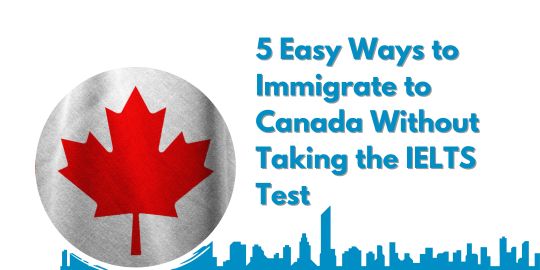
Moving to Canada is a dream for many people around the world. With its high quality of life, excellent healthcare system, and diverse culture, it's no wonder why Canada is a popular destination for immigrants. However, one of the challenges that immigrants often face is passing language proficiency tests like the IELTS (International English Language Testing System). But did you know that there are ways to Canada Immigration Programs a without taking the IELTS test? Here are 5 easy ways:
Provincial Nominee Programs (PNPs): Many Canadian provinces have their own immigration programs known as Provincial Nominee Programs (PNPs). These programs allow provinces to nominate individuals who have the skills and experience needed in their local labor market. Some PNPs don't require applicants to take the IELTS test, especially if they have strong connections to the province or if their occupation is in high demand.
Quebec Skilled Worker Program: Quebec, a French-speaking province in Canada, has its own immigration program called the Quebec Skilled Worker Program (QSWP). While French language proficiency is important for this program, it doesn't require applicants to take the IELTS test. Instead, applicants can demonstrate their French language skills through other means, such as interviews or language courses.
Canadian Experience Class (CEC): The Canadian Experience Class (CEC) is a federal immigration program for individuals who have work experience in Canada. If you have worked in Canada for at least one year in a skilled occupation, you may be eligible to apply for permanent residency under the CEC. The good news is that the CEC doesn't require applicants to take the IELTS test if they can prove their proficiency in English or French through their work experience.
Family Sponsorship: If you have a close relative who is a Canadian citizen or permanent resident, they may be able to sponsor you for immigration to Canada. Family sponsorship allows eligible relatives to sponsor their spouse, common-law partner, dependent child, parent, or grandparent for permanent residency. While language proficiency is still important for some sponsorship applications, there are cases where the sponsor's relationship with the applicant can outweigh the need for language test scores.
Investor and Entrepreneur Programs: Canada offers various investor and entrepreneur immigration programs for individuals who are willing to invest in the Canadian economy or start a business. These programs typically have different requirements than traditional skilled worker programs and may not require applicants to take language proficiency tests like the IELTS. Instead, applicants are evaluated based on their business experience, investment plans, and ability to contribute to the Canadian economy.
In conclusion, Canada Immigration Programs without taking the IELTS test is possible through various pathways such as Provincial Nominee Programs, Quebec Skilled Worker Program, Canadian Experience Class, Family Sponsorship, and Investor/Entrepreneur Programs. By exploring these options and meeting the specific requirements of each program, you can make your dream of living in Canada a reality without the stress of language proficiency tests.
0 notes
Text
Canada Immigration Program for Unskilled Workers
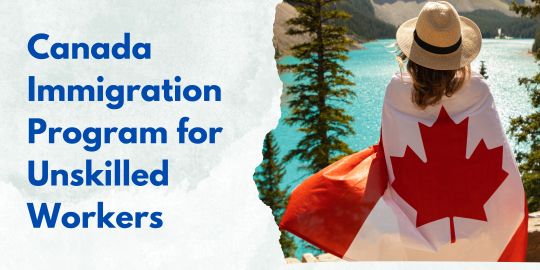
Canada is known for its beautiful landscapes, friendly people, and opportunities for a better life. If you're someone without specialized skills but dreams of making Canada your home, you're in luck! Canada has an immigration program just for people like you.
What is the Canada Immigration Programs for Unskilled Workers?
This program is called the Temporary Foreign Worker Program (TFWP). It allows Canadian employers to hire foreign workers to fill temporary labour shortages when qualified Canadian citizens or permanent residents are not available. This means that if there's a job in Canada that needs to be done, and Canadians aren't available to do it, you might be able to come and work in Canada temporarily.
Who Can Apply?
To apply for the Temporary Foreign Worker Program, you must meet certain criteria:
Employer Sponsorship: First, you need a job offer from a Canadian employer. This means a Canadian employer must offer you a job, and they must apply to hire you through the TFWP.
Labour Market Impact Assessment (LMIA): Your employer needs to get an LMIA, which is a document from the Canadian government. It shows that there's a need for a foreign worker to fill the job because no Canadians are available to do it.
Work Permit: Once your employer gets the LMIA, you can apply for a work permit. This permit allows you to work in Canada for a specific employer and for a specific period.
Meet Health and Security Requirements: You must also pass medical exams and security checks.
What Jobs Are Available?
Jobs available through the Temporary Foreign Worker Program can vary. They can range from farm work to construction, hospitality, caregiving, and more. The important thing is that the job must be one that Canadians are not available or willing to do.
How Long Can You Stay?
The length of time you can stay in Canada depends on the job and the terms of your work permit. Sometimes, if your employer still needs you after your initial work permit expires, they can extend it or even apply for you to become a permanent resident.
What's Next?
If you work hard, follow the rules, and your employer likes your work, you might have the chance to stay longer in Canada or even become a permanent resident. Being a permanent resident means you can live, work, and study anywhere in Canada, and eventually, you may even be able to apply for Canadian citizenship!
Conclusion
Canada Immigration Programs Temporary Foreign Worker Program offers a pathway for unskilled workers to come and work temporarily in Canada. It's a chance to experience life in a beautiful country, earn money, and maybe even build a future here. So, if you dream of making Canada your home, don't be discouraged by your lack of specialized skills. There's a place for you in Canada too!
0 notes
Text
Canada's Immigration Programs for Low-Skilled Workers

Canada is known for its welcoming attitude towards immigrants from all walks of life. If you're someone with low skills but big dreams, Canada might just have the opportunity you've been looking for. Let's dive into Canada Immigration Programs designed especially for low-skilled workers.
1. Temporary Foreign Worker Program (TFWP):
If you're looking to work in Canada temporarily, the Temporary Foreign Worker Program might be your ticket. This program allows Canadian employers to hire foreign workers to fill temporary labor shortages. These jobs usually don't require a high level of education or training. From farm work to hospitality, there are various industries that often require low-skilled workers.
2. Seasonal Agricultural Worker Program (SAWP):
Do you have experience in agriculture or a willingness to work in the fields? The Seasonal Agricultural Worker Program could be your pathway. This program allows farmers to hire workers from certain countries for seasonal agricultural work when Canadians and permanent residents aren't available.
3. Provincial Nominee Programs (PNPs):
Many provinces in Canada have their own immigration programs tailored to their specific needs. Some provinces offer pathways for low-skilled workers through their Provincial Nominee Programs. These programs allow provinces to nominate individuals who have the skills, education, and work experience needed in their local labor market, including those with lower skill levels.
4. Atlantic Immigration Pilot Program (AIPP):
If you're interested in working in the Atlantic provinces of Canada (Nova Scotia, New Brunswick, Prince Edward Island, and Newfoundland and Labrador), the Atlantic Immigration Pilot Program might be a good fit. This program helps employers in the Atlantic region hire foreign workers for jobs they haven't been able to fill locally. It includes options for low-skilled workers, such as in food service, retail, or housekeeping.
5. Caregiver Programs:
Canada recognizes the importance of caregivers and has specific immigration pathways for them. If you have experience caring for children, the elderly, or people with medical needs, you may be eligible to come to Canada through caregiver programs. These programs offer both temporary and permanent residency options.
What You Need to Know:
Language Requirements: While some programs require proficiency in English or French, many low-skilled worker programs have more relaxed language requirements.
Work Permits: Most of these programs require you to obtain a work permit before coming to Canada. This permit allows you to work legally in Canada for a specific employer and period.
Pathways to Permanent Residency: Some temporary worker programs offer pathways to permanent residency. If you're hoping to make Canada your permanent home, explore programs that can lead to permanent residency down the road.
Canada Immigration Programs for low-skilled workers offer opportunities for a better future. If you're willing to work hard and contribute to Canadian society, there's a place for you in the Great White North. Explore your options, pack your bags, and get ready for an adventure in Canada!
0 notes
Text
Canada Immigration Programs for Pilots: Your Pathway to Soaring High
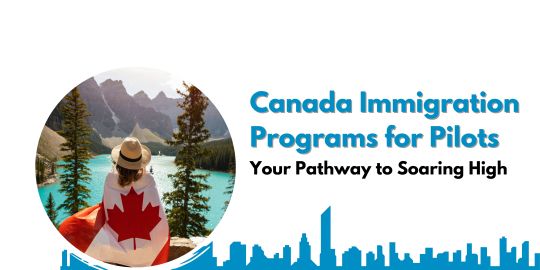
Are you a pilot dreaming of soaring high in the Canadian skies? Canada, with its vast landscapes and dynamic aviation industry, might just be the perfect destination for you. But how do you navigate the immigration process? Fear not, as we take you through Canada Immigration Programs tailored specifically for pilots, making your dream of flying in the Great White North a reality.
Express Entry Program:The Express Entry program is like a fast track lane for skilled workers, including pilots, who want to become permanent residents of Canada. It manages applications for three economic immigration programs: the Federal Skilled Worker Program, the Federal Skilled Trades Program, and the Canadian Experience Class.As a pilot, you might qualify under the Federal Skilled Worker Program if you meet certain criteria such as work experience, language proficiency, and education. Your occupation as a pilot falls under Canada's National Occupational Classification (NOC) code system, which assigns codes to different job titles and descriptions. Pilots usually fall under NOC code 2271.
Provincial Nominee Programs (PNPs):Each province and territory in Canada has its own immigration programs called Provincial Nominee Programs (PNPs). These programs are designed to address specific labor market needs of the provinces. Some provinces, like Manitoba and Saskatchewan, have specific streams for skilled workers, including pilots.To apply through a PNP, you may need a job offer from an employer in that province. Some PNPs have streams for candidates with job offers in occupations that are in-demand, including pilots. Keep in mind that eligibility criteria and application processes may vary between provinces.
Atlantic Immigration Pilot Program (AIPP):If you're interested in working in one of Canada's Atlantic provinces - Nova Scotia, New Brunswick, Prince Edward Island, or Newfoundland and Labrador - the Atlantic Immigration Pilot Program (AIPP) might be for you. This program is aimed at attracting skilled workers to the Atlantic region to fill labor market gaps.To be eligible for the AIPP, you'll need a job offer from a designated employer in one of the participating provinces. As a pilot, you could qualify under the Atlantic High-Skilled Program, which targets workers in managerial, professional, and technical/skilled trades occupations, including pilots.
Rural and Northern Immigration Pilot (RNIP):The Rural and Northern Immigration Pilot (RNIP) is another avenue for pilots looking to immigrate to Canada. This program aims to spread the benefits of economic immigration to smaller communities across Canada by matching skilled workers with job opportunities in participating communities.To apply through the RNIP, you'll need a job offer from a designated employer in one of the participating communities. Pilots with experience and skills in demand by these communities could find opportunities through this program.
Family Sponsorship:If you have a spouse, common-law partner, or close relative who is a Canadian citizen or permanent resident, they may be able to sponsor you for permanent residence in Canada. However, family sponsorship does not usually apply directly to pilots unless they have family members who meet sponsorship criteria.
In conclusion, Canada offers various Canada Immigration Programs pathways for pilots seeking to build a future in the country. Whether through federal programs like Express Entry, provincial programs like PNPs and AIPP, or community-specific initiatives like RNIP, there are options to suit different preferences and circumstances.
0 notes
Text
What is the program for new immigrants in Canada?
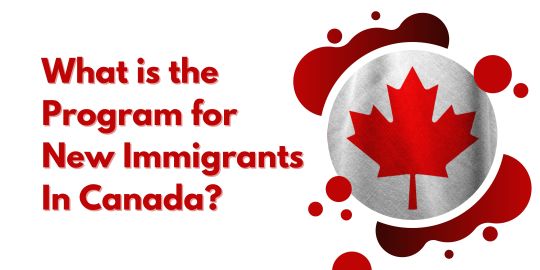
Canada has a welcoming reputation for immigrants from around the world. If you're planning to move to Canada, you might be curious about the Canada Immigration Programs available to help you settle in and start a new life. Let's take a closer look at what Canada offers to newcomers.
1. Express Entry System: One of the main programs for skilled immigrants is the Express Entry system. This program manages applications for three economic immigration categories: Federal Skilled Worker Program, Federal Skilled Trades Program, and Canadian Experience Class. To apply, you need to create an online profile and submit your qualifications. Based on factors like your age, education, work experience, and language skills, you'll be given a score. If you meet the criteria, you might get an Invitation to Apply (ITA) for permanent residence.
2. Provincial Nominee Programs (PNPs): Canada's provinces and territories have their own immigration programs called Provincial Nominee Programs (PNPs). These programs allow provinces to nominate individuals who want to immigrate and settle in a specific province. Each province has its own criteria and streams tailored to its economic and labor market needs. If you're interested in a particular province, you can explore their PNP to see if you qualify.
3. Family Sponsorship: If you have family members who are Canadian citizens or permanent residents, they may be able to sponsor you to come to Canada. Family sponsorship allows close relatives to reunite with their loved ones in Canada. Spouses, partners, dependent children, parents, and grandparents are eligible for sponsorship under this program.
4. Start-Up Visa Program: For entrepreneurs with innovative business ideas, Canada offers the Start-Up Visa Program. This program aims to attract foreign entrepreneurs who can create jobs and drive economic growth in Canada. To qualify, you need to have a qualifying business idea, get support from a designated organization, and meet certain criteria related to language proficiency and financial stability.
5. Refugee and Humanitarian Resettlement Programs: Canada is committed to providing protection to refugees and individuals in need of humanitarian assistance. The country has various programs to support the resettlement of refugees, including government-assisted refugee programs, privately sponsored refugee programs, and blended visa office-referred programs. These programs help refugees rebuild their lives in Canada by providing essential support and services.
6. Settlement Services: Once you arrive in Canada, there are settlement services available to help you adapt to your new environment. These services include language classes, job search assistance, housing support, and cultural orientation programs. Settlement organizations across Canada offer support tailored to the needs of immigrants and refugees, helping them integrate into Canadian society and thrive in their new home.
In conclusion, Canada offers a range of Canada Immigration Programs to welcome and support new immigrants. Whether you're a skilled worker, a family member of a Canadian resident, an entrepreneur, or a refugee, there are pathways available to help you make Canada your new home. By exploring these programs and seeking support from settlement services, you can embark on a successful journey of immigration to Canada.
0 notes
Text
How to canada immigration programs as a Taxi driver
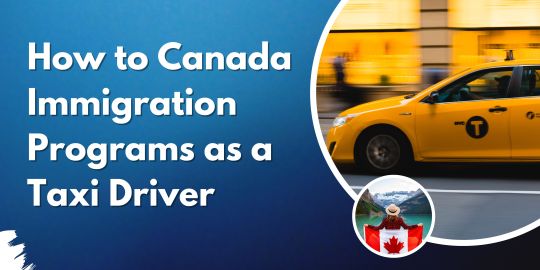
Thinking about moving to Canada to pursue a career as a taxi driver? Great choice! Canada is a diverse and welcoming country with plenty of opportunities for immigrants. But how do you go about Canada Immigration Programs as a taxi driver? Don't worry, we've got you covered with this simple guide.
Understand the Immigration Programs: Canada offers several immigration programs, but as a taxi driver, you'll likely be interested in the Provincial Nominee Program (PNP) or the Express Entry system. These programs can lead to permanent residency in Canada.
Provincial Nominee Program (PNP): Many provinces in Canada have their own PNP streams tailored to specific occupations, including transportation. Research the PNPs of provinces like Ontario, British Columbia, or Alberta, as they often have streams for truck drivers, taxi drivers, and other transportation workers.
Express Entry System: Express Entry is a points-based system that manages applications for permanent residence under three federal economic immigration programs: the Federal Skilled Worker Program, the Federal Skilled Trades Program, and the Canadian Experience Class. As a taxi driver, you might qualify under the Federal Skilled Worker Program or the Canadian Experience Class if you have work experience in Canada.
Meet the Requirements: Each immigration program has its own set of requirements. Generally, you'll need to prove your proficiency in English or French, provide proof of work experience, and in some cases, have a job offer from a Canadian employer. Make sure to check the specific requirements of the program you're applying to.
Language Proficiency: As a taxi driver, communication with passengers is essential. That's why proving your proficiency in English or French is crucial. You may need to take language tests like IELTS or CELPIP for English, or TEF for French.
Work Experience: You'll need to demonstrate your work experience as a taxi driver. Keep records of your employment history, including job titles, duties, and duration of employment. This will help support your application.
Job Offer: While not always necessary, having a job offer from a Canadian employer can boost your chances of immigrating to Canada. Consider reaching out to taxi companies in the province you're interested in and inquire about job opportunities.
Submit Your Application: Once you've gathered all the necessary documents and met the requirements, it's time to submit your application. Follow the instructions carefully and ensure all forms are filled out accurately.
Wait for a Decision: Processing times vary depending on the program and the volume of applications. Be patient and wait for a decision on your application. You may be required to undergo medical exams and provide additional information during this time.
Prepare for Arrival: Congratulations! If your application is approved, you'll receive your permanent resident visa. Start planning your move to Canada, including finding housing, researching transportation options, and familiarizing yourself with the city you'll be living in.
Remember, Canada Immigration Programs is a big decision, but with determination and proper preparation, you can achieve your dream of becoming a taxi driver in Canada.
0 notes
Text
Top 10 Immigration Programs for you to immigrate to Canada
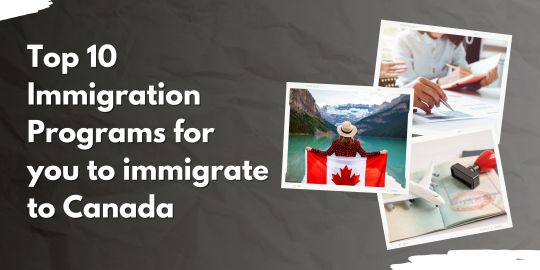
Canada, often referred to as the Great White North, is a land of diversity, opportunity, and breathtaking landscapes. If you dream of making Canada your new home, there are various Canada Immigration Programs to explore. Whether you're a skilled worker, entrepreneur, or student, Canada welcomes you with open arms. Here's a simplified guide to the top 10 immigration programs for you to consider:
Express Entry: This program is for skilled workers who wish to immigrate to Canada permanently. It manages applications for three economic immigration categories: the Federal Skilled Worker Program, the Federal Skilled Trades Program, and the Canadian Experience Class.
Provincial Nominee Program (PNP): Each Canadian province and territory, except for Quebec, has its own PNP. These programs allow provinces to nominate individuals who want to immigrate to Canada and who are interested in settling in a particular province.
Atlantic Immigration Pilot: Designed for skilled workers and international graduates who want to live in the Atlantic provinces of Nova Scotia, New Brunswick, Newfoundland and Labrador, or Prince Edward Island.
Caregiver Program: This program is for individuals who have experience in caring for children, the elderly, or people with medical needs. It offers pathways to permanent residence for caregivers who meet specific requirements.
Start-up Visa Program: If you're an entrepreneur with an innovative business idea and the potential to create jobs in Canada, this program could be for you. It's designed to attract entrepreneurs who can contribute to Canada's economy.
Rural and Northern Immigration Pilot: This program aims to spread the benefits of economic immigration to smaller communities by creating a pathway to permanent residence for skilled foreign workers who want to live in eligible communities.
Quebec Skilled Worker Program (QSWP): Quebec has its own immigration system separate from the rest of Canada. The QSWP is for individuals who want to settle in Quebec as skilled workers.
International Experience Canada (IEC): This program allows young people aged 18-35 (or in some cases, 18-30) from certain countries to work and travel in Canada for up to two years.
Study Permit: If you wish to study in Canada, you'll need a study permit. This doesn't directly lead to permanent residence, but it can be a stepping stone through programs like the Post-Graduation Work Permit Program.
Family Sponsorship: Canadian citizens and permanent residents can sponsor their family members to come to Canada as permanent residents. This includes spouses, partners, dependent children, parents, and grandparents.
These are just a few of the pathways available for Canada Immigration Programs. Each program has its own set of requirements and eligibility criteria, so it's essential to research thoroughly and choose the one that best suits your situation and aspirations. With its welcoming atmosphere and diverse opportunities, Canada truly is a land of endless possibilities for immigrants.
0 notes
Text
Canada Immigration Program For Truck Driver
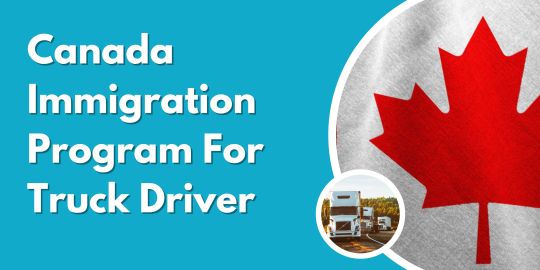
Are you a truck driver dreaming of steering your career towards Canada? Well, you're in luck! Canada has a special Canada Immigration Programs tailored just for skilled truck drivers like you. This program can be your ticket to living and working in one of the most beautiful countries in the world. Let's take a closer look at how you can make your Canadian dream a reality.
Understanding the Program:
Canada's immigration program for truck drivers falls under the umbrella of the Temporary Foreign Worker Program (TFWP). This program allows Canadian employers to hire foreign workers temporarily to fill specific labor shortages.
Eligibility Criteria:
To qualify for the program, you need to meet certain eligibility criteria:
Valid Job Offer: You must have a valid job offer from a Canadian employer who is willing to sponsor you. This job offer should be for a full-time, permanent position as a truck driver.
Work Experience: You need to have a certain level of work experience as a truck driver. Typically, you should have at least one to two years of experience, although this can vary depending on the specific requirements of the employer and the province.
Language Proficiency: You must demonstrate proficiency in English or French, as these are the two official languages of Canada. This is usually done through language tests such as the IELTS or CELPIP for English and the TEF for French.
Valid License: You must have a valid driver's license that allows you to operate commercial vehicles in Canada. Depending on the province, you may need to obtain additional endorsements or certifications.
Clean Record: You should have a clean driving record with no major traffic violations or criminal convictions.
The Application Process:
Once you have secured a job offer and met the eligibility criteria, the next step is to apply for a work permit. Here's what the application process typically involves:
Employer's Role: Your prospective employer will need to obtain a positive Labour Market Impact Assessment (LMIA) from Employment and Social Development Canada (ESDC). This assessment confirms that hiring a foreign worker will not negatively impact the Canadian labor market.
Your Role: You will need to submit your work permit application to Immigration, Refugees and Citizenship Canada (IRCC). This application will include various forms, documents, and fees. You may also need to undergo a medical examination and provide biometrics (fingerprints and photo).
Processing Time: The processing time for work permit applications can vary, so it's essential to apply well in advance of your intended start date.
Arrival in Canada: Once your work permit is approved, you can make arrangements to travel to Canada and begin your employment as a truck driver.
Benefits of Working in Canada:
Working as a truck driver in Canada offers numerous benefits, including:
High Demand: There is a significant demand for skilled truck drivers across Canada, especially in remote and rural areas.
Good Pay: Truck drivers in Canada typically earn competitive salaries, with opportunities for overtime pay and bonuses.
Quality of Life: Canada is known for its high quality of life, excellent healthcare system, and diverse culture. As a truck driver, you'll have the chance to explore the country's breathtaking landscapes and vibrant cities.
Pathway to Permanent Residency: Working in Canada as a skilled truck driver can also provide a pathway to permanent residency through programs such as the Provincial Nominee Program (PNP) or the Express Entry system.
Conclusion:
Canada Immigration Programs for truck drivers offers a fantastic opportunity to pursue your career goals and build a brighter future for yourself and your family. By meeting the eligibility criteria and following the application process, you can embark on an exciting journey towards living and working in one of the most welcoming and beautiful countries in the world. So, what are you waiting for?
0 notes
Text
Canada's Immigration Points Calculator: A Simple Guide

Are you dreaming of starting a new life in Canada? The Great White North beckons with its promise of diverse opportunities and a high quality of life. But navigating the immigration process can seem daunting, especially when faced with terms like "points calculator." Fear not! We're here to break it down for you in simple terms so you can understand how to calculate your chances of immigrating to Canada.
Canada has several Canada Immigration Programs, each with its own set of requirements and criteria. One of the key tools used to assess eligibility is the points calculator. This calculator assigns points based on various factors such as age, education, work experience, language proficiency, and adaptability.
Let's take a closer look at each of these factors:
Age: The younger you are, the more points you'll score. This is because younger immigrants are seen as having more potential to contribute to the Canadian economy over a longer period of time.
Education: Having a higher level of education can earn you more points. A bachelor's degree, for example, will typically earn you more points than a high school diploma.
Work Experience: The number of years you've worked in your field also plays a role. More experience means more points, especially if your experience is in a high-demand occupation in Canada.
Language Proficiency: Proficiency in English and/or French is crucial for integration into Canadian society. You can earn points for your language skills by taking standardized language tests like the IELTS or CELPIP for English and TEF for French.
Adaptability: Factors such as having a job offer in Canada, having family members already living in Canada, or having studied in Canada can earn you additional points.
Now, let's put it all together. Imagine you're a 30-year-old with a master's degree, five years of work experience in a high-demand occupation, proficient in English with a good score on your language test, and you have a job offer in Canada. You'd likely score quite high on the points calculator, increasing your chances of being selected for immigration.
It's important to note that the points required for immigration can vary depending on the Canada Immigration Programs you're applying through. For example, the Express Entry system, which manages applications for the Federal Skilled Worker Program, the Federal Skilled Trades Program, and the Canadian Experience Class, has its own points system.
In conclusion, while the immigration points calculator may seem intimidating at first, it's actually a helpful tool designed to assess your eligibility for immigration to Canada. By understanding how it works and knowing which factors contribute to your score, you can better prepare yourself for the journey ahead. So, if Canada is calling your name, don't be afraid to take the first step and calculate your points today!
0 notes
Text
Get Canada immigration programs in 2024: Eligibility & Process

Are you dreaming of starting a new chapter of your life in Canada? With its breath taking landscapes, diverse culture, and strong economy, it's no wonder why so many people aspire to immigrate there. Fortunately, Canada offers various Canada Immigration Programs to make this dream a reality for many.
In 2024, understanding the eligibility criteria and application process for Canada's immigration programs is crucial. Let's break it down into simple terms to help you navigate through the possibilities.
Express Entry System: This remains one of the most popular routes to immigrate to Canada. It manages applications for three federal economic immigration programs: the Federal Skilled Worker Program, the Federal Skilled Trades Program, and the Canadian Experience Class.
Eligibility: To qualify, you need to meet certain criteria such as education, work experience, language proficiency (English or French), and other factors.
Process: You create an Express Entry profile, and if you meet the criteria for one of the programs, you'll be placed in a pool of candidates. Based on your Comprehensive Ranking System (CRS) score, you may receive an Invitation to Apply (ITA) for permanent residence.
Provincial Nominee Programs (PNPs): Each Canadian province and territory, except for Quebec, has its own PNP. These programs allow provinces to nominate individuals who wish to immigrate and settle in a particular province.
Eligibility: Eligibility criteria vary depending on the specific PNP and the needs of the province. Generally, factors such as job offer, work experience, and ties to the province are considered.
Process: You apply to the province or territory where you wish to settle. If nominated, you can then apply for permanent residence through the Express Entry system or a separate process.
Atlantic Immigration Pilot: This program is designed to address the labor market needs of Canada's Atlantic provinces: Nova Scotia, New Brunswick, Newfoundland and Labrador, and Prince Edward Island.
Eligibility: To qualify, you must have a job offer from a designated employer in one of the participating provinces and meet other criteria.
Process: Your employer plays a significant role in this process, as they must also fulfill certain requirements. Once you have a job offer, you can apply for a nomination under this program.
Family Sponsorship: If you have a family member who is a Canadian citizen or permanent resident, they may be able to sponsor you for immigration to Canada.
Eligibility: Eligible sponsors include spouses, common-law partners, parents, grandparents, dependent children, and, in some cases, other relatives.
Process: The sponsor must apply to sponsor their family member, and the sponsored person must apply for permanent residence.
Start-Up Visa Program: If you're an entrepreneur with an innovative business idea and the potential to create jobs in Canada, this program could be for you.
Eligibility: You must have a qualifying business and meet certain criteria related to investment and language proficiency.
Process: You need to get support from a designated organization and meet other requirements to apply for this program.
Remember, the eligibility criteria and processes can change, so it's essential to stay updated by visiting the official website of Immigration, Refugees and Citizenship Canada (IRCC). Additionally, consider seeking assistance from immigration consultants or lawyers to ensure a smooth application process.
In conclusion, Canada offers a variety of Canada Immigration Programs to suit different backgrounds and aspirations. By understanding the eligibility requirements and application processes, you can take the first steps toward making your Canadian dream a reality.
0 notes
Text
What is Canada Popular immigration Program?
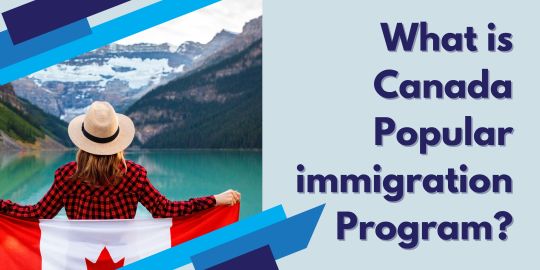
Canada is a beautiful country known for its welcoming nature and diverse culture. People from all over the world dream of starting a new life there, and luckily, Canada offers various Canada Immigration Programs to help make that dream a reality. Let's take a closer look at some of Canada's popular immigration programs, designed to welcome newcomers and contribute to the country's growth.
Express Entry:
Express Entry is like a fast lane for skilled workers who want to move to Canada permanently. It's a system that manages applications for three key economic immigration programs: the Federal Skilled Worker Program, the Federal Skilled Trades Program, and the Canadian Experience Class. To apply, you need to create an online profile showcasing your skills, education, language ability, work experience, and other details. Based on a points system, candidates are ranked, and the highest-scoring applicants are invited to apply for permanent residence.
Provincial Nominee Program (PNP):
Each province and territory in Canada has its own immigration programs tailored to its specific needs. These programs allow provinces to nominate individuals who want to settle in that particular region. Requirements and application processes vary depending on the province, but generally, applicants must have the skills, education, and work experience needed in that province. Being nominated by a province can significantly increase your chances of obtaining permanent residency.
Family Sponsorship:
Canada values the importance of family reunification, and thus, offers the Family Sponsorship program. Canadian citizens and permanent residents can sponsor their spouses, partners, dependent children, parents, and grandparents to immigrate to Canada. Sponsors must be able to support their family members financially and ensure they don't need social assistance from the government. This program is a great way for families to be together and start a new life in Canada.
Atlantic Immigration Pilot:
The Atlantic Immigration Pilot is a special program aimed at attracting skilled workers and international graduates to Canada's Atlantic provinces: New Brunswick, Newfoundland and Labrador, Nova Scotia, and Prince Edward Island. Employers in these provinces can hire foreign workers through this program if they can't find suitable candidates locally. If you're interested in working and living in one of these beautiful coastal regions, this could be the pathway for you.
International Experience Canada (IEC):
If you're a young person looking to gain international work experience while exploring Canada, the International Experience Canada program is for you. It provides opportunities for youth aged 18 to 35 from certain countries to work and travel in Canada for up to two years. There are different categories within the IEC program, such as Working Holiday, Young Professionals, and International Co-op, each with its own eligibility criteria.
These are just a few of the popular Canada Immigration Programs Canada has to offer. Whether you're a skilled worker, a student, or someone wanting to reunite with family, there's likely a pathway for you to call Canada home. It's essential to research and understand the requirements of each program to determine which one suits your situation best. With determination and the right qualifications, you could soon be on your way to starting a new chapter in the Great White North.
0 notes
Text
Canada Immigration Program for Unskilled Workers: A Simple Guide
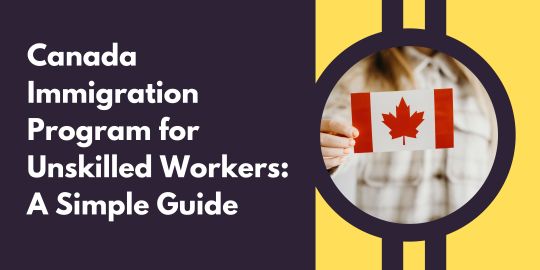
Canada is a beautiful country with lots of opportunities, and if you're thinking about moving here to work, you're in luck! Canada Immigration Programs specifically designed for unskilled workers like you. In this article, we'll break down everything you need to know about these programs, so you can understand how to make your dream of living and working in Canada a reality.
What are Unskilled Workers?
Unskilled workers are people who may not have specialized training or education in a particular field. They often perform tasks that require less training and can learn on the job.
Canada's Immigration Programs for Unskilled Workers
Temporary Foreign Worker Program (TFWP): This program allows Canadian employers to hire foreign workers to fill temporary labor shortages. If you have a job offer from a Canadian employer, you may be eligible to apply for a work permit under this program.
Seasonal Agricultural Worker Program (SAWP): If you're interested in working in Canada's agriculture sector, the SAWP may be for you. This program allows employers to hire temporary foreign workers to fill seasonal agricultural jobs, such as fruit picking or farm labor.
Provincial Nominee Programs (PNPs): Many provinces in Canada have their own immigration programs designed to address specific labor needs. Some provinces offer pathways for unskilled workers to immigrate and work permanently in Canada if they meet certain criteria.
Requirements and Eligibility
To apply for any of these programs, you'll typically need to meet certain requirements, such as:
Having a valid job offer from a Canadian employer
Meeting health and security requirements
Demonstrating the ability to support yourself and any dependents while living in Canada
Meeting language proficiency requirements (in some cases)
It's important to note that eligibility criteria may vary depending on the specific program and your individual circumstances.
How to Apply
The application process for each program may differ, but in general, you'll need to:
Find a Job: Start by looking for job opportunities in Canada that match your skills and experience. You can search online job boards, contact recruitment agencies, or explore job listings on Canadian government websites.
Obtain a Job Offer: Once you've found a job, you'll need to secure a job offer from a Canadian employer. Your employer may need to obtain a Labour Market Impact Assessment (LMIA) to demonstrate that there are no Canadian workers available to fill the position.
Apply for a Work Permit: With your job offer in hand, you can apply for a work permit through the relevant immigration program. You'll need to submit your application, along with any required documents and fees, to the appropriate immigration authorities.
Wait for a Decision: After submitting your application, you'll need to wait for a decision on your work permit. If approved, you'll receive a work permit allowing you to live and work in Canada for the duration specified on the permit.
Final Thoughts
Moving to a new country can be a big step, but with the right information and guidance, you can navigate the Canada Immigration Programs process successfully. Canada offers opportunities for unskilled workers to come and contribute to its workforce, so if you're ready for a new adventure, consider exploring your options for immigrating to Canada today!
0 notes
Text
Top 5 Canada Immigration Programs for skilled workers: Read before you apply
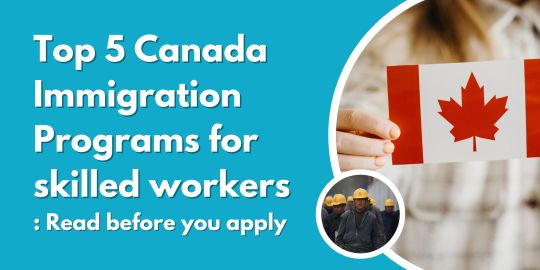
Canada, with its vast landscapes and diverse cultures, stands as one of the most desirable destinations for skilled workers looking to immigrate. The country offers numerous Canada Immigration Programs tailored to attract talented individuals from around the world. However, navigating through these options can be overwhelming. Fear not, for we've compiled a list of the top five Canada immigration programs for skilled workers that you should consider before applying.
Express Entry System:The Express Entry system is like a golden ticket for skilled workers aiming to settle in Canada. It manages applications for three federal economic immigration programs: the Federal Skilled Worker Program, the Federal Skilled Trades Program, and the Canadian Experience Class. Through Express Entry, candidates are ranked based on factors like age, education, work experience, and language proficiency. Those with the highest scores are invited to apply for permanent residence. It's a fast and efficient way to kickstart your Canadian dream.
Provincial Nominee Programs (PNPs):If you have a particular Canadian province in mind for settling down, PNPs could be your best bet. Each province and territory in Canada (except for Quebec) has its own PNP, designed to address its specific labor market needs. These programs target skilled workers, entrepreneurs, and graduates who can contribute to the local economy. By obtaining a provincial nomination, you gain additional points in the Express Entry system, enhancing your chances of receiving an Invitation to Apply (ITA) for permanent residence.
Atlantic Immigration Pilot Program (AIPP):The Atlantic provinces of Canada—Nova Scotia, New Brunswick, Newfoundland and Labrador, and Prince Edward Island—joined forces to launch the AIPP, aiming to address labor shortages in the region. This employer-driven program connects skilled workers with job opportunities offered by designated employers in the Atlantic provinces. If you secure a valid job offer and meet the eligibility criteria, you can apply for permanent residence through the AIPP stream, bringing you closer to your Canadian dream.
Rural and Northern Immigration Pilot (RNIP):Canada isn't just about its bustling cities; rural and northern communities also seek skilled workers to support their development. The RNIP facilitates the immigration process for skilled workers willing to settle in participating communities across the country. Similar to the AIPP, this program requires a genuine job offer from a designated employer in a participating community. By fulfilling the program requirements, you can apply for permanent residence and contribute to the growth of these lesser-known but vibrant Canadian regions.
Startup Visa Program:Are you an entrepreneur with an innovative business idea? The Startup Visa Program might be your ticket to Canada. This program targets entrepreneurs who have the potential to build innovative businesses that can create jobs and compete internationally. To qualify, you need support from a designated Canadian venture capital fund, angel investor group, or business incubator. If successful, you and your family can obtain permanent residence in Canada, allowing you to establish and grow your startup in a thriving environment.
Before applying to any of these programs, it's crucial to thoroughly research and understand their requirements, eligibility criteria, and application processes. Additionally, consider seeking professional guidance or consulting with Canada Immigration Programs experts to ensure a smooth and successful immigration journey to Canada. With the right information and preparation, you can turn your Canadian dream into a reality and embark on a new chapter of opportunity and prosperity in the Great White North.
0 notes
Text
5 Canadian Immigration Programs for Healthcare Workers

Are you a healthcare professional looking to start a new chapter in Canada? Canada's healthcare system is renowned worldwide, and the country welcomes skilled workers like you to contribute to its vibrant healthcare sector. To make your journey smoother, here are five Canada Immigration Programs tailored for healthcare workers:
Express Entry Program:Express Entry is like a fast lane to Canadian immigration. It's a system that manages applications for skilled workers who want to become permanent residents. Under this program, you'll be assessed based on factors like your education, work experience, language proficiency, and other criteria. If you meet the requirements, you can receive an Invitation to Apply (ITA) for permanent residency.
Provincial Nominee Program (PNP):Each Canadian province and territory has its own healthcare needs and immigration programs. Many provinces have specific streams under their Provincial Nominee Programs (PNPs) that target healthcare professionals. For example, Ontario's Ontario Immigrant Nominee Program (OINP) has streams like the Human Capital Priorities Stream and the Ontario Express Entry Stream, which are beneficial for healthcare workers.
Atlantic Immigration Pilot Program (AIPP):The Atlantic provinces of Canada - Nova Scotia, New Brunswick, Newfoundland and Labrador, and Prince Edward Island - face unique demographic challenges, including an aging population. To address this, they've launched the AIPP. This program aims to attract skilled workers to the Atlantic region, including healthcare professionals. Participating employers can help you get a job offer, which is a key requirement for this program.
Rural and Northern Immigration Pilot (RNIP):Many rural and northern communities in Canada are in need of healthcare workers. The RNIP was designed to address labor shortages in these regions by connecting skilled workers with employers in specific communities. If you secure a job offer from a participating community, you may be eligible to apply for permanent residency through this program.
Caregiver Program:Canada recognizes the importance of caregivers in supporting families and individuals who need assistance. If you have experience as a caregiver, you may qualify for one of the caregiver immigration pathways. These programs allow caregivers to come to Canada to work and eventually apply for permanent residency. While not specific to healthcare workers, these programs can be a pathway for those with relevant experience.
Before applying to any of these programs, it's essential to carefully review the eligibility criteria and application process. Additionally, improving your English or French language skills through language tests like IELTS or CELPIP can enhance your chances of success.
In conclusion, Canada offers several immigration pathways for healthcare professionals seeking to build a career in this diverse and welcoming country. Whether you're a nurse, doctor, physiotherapist, or any other healthcare professional, there's likely a Canada Immigration Programs that suits your skills and aspirations. Start exploring your options today, and take the first step towards your Canadian dream!
0 notes
Text
Top 10 Canada Immigration Programs for Skilled Workers
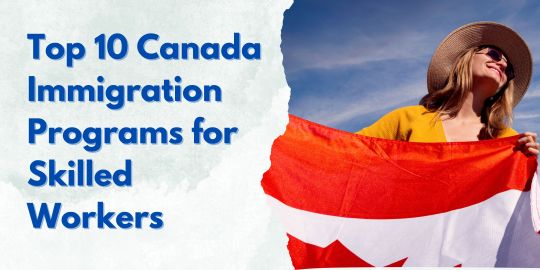
Canada is a land of opportunities, drawing skilled workers from around the world to contribute to its vibrant economy and diverse society. If you're considering making Canada your new home, there are various Canada Immigration Programs tailored to skilled workers like you. Here's a simplified guide to the top 10 Canada immigration programs:
Express Entry: This is Canada's flagship immigration system for skilled workers. It manages applications for three federal economic immigration programs: the Federal Skilled Worker Program, the Federal Skilled Trades Program, and the Canadian Experience Class. Eligible candidates are ranked based on factors like age, education, work experience, and language proficiency.
Provincial Nominee Program (PNP): Each Canadian province and territory (except for Quebec) has its own PNP, offering pathways for skilled workers with job offers or ties to specific provinces. PNPs target individuals whose skills are in demand in particular regions, allowing provinces to select candidates who will contribute to their local economies.
Quebec Skilled Worker Program (QSWP): As Canada's largest province by area, Quebec has its own immigration selection system. The QSWP is designed for skilled workers who intend to settle in Quebec. Applicants are assessed based on factors such as education, work experience, language proficiency, and other factors specific to Quebec's immigration policies.
Atlantic Immigration Pilot Program (AIPP): This program is aimed at skilled workers, intermediate-skilled workers, and international graduates who wish to settle in Canada's Atlantic provinces: Nova Scotia, New Brunswick, Prince Edward Island, and Newfoundland and Labrador. Candidates must have a job offer from a designated employer in one of these provinces to be eligible.
Rural and Northern Immigration Pilot (RNIP): The RNIP is designed to address labor market needs in smaller communities across Canada. Participating communities have the authority to recommend candidates for permanent residence based on local job offers and community connections.
Agri-Food Pilot: This pilot program targets experienced, non-seasonal workers in specific agri-food occupations. It aims to address labor shortages in Canada's agri-food sector by offering a pathway to permanent residence for eligible candidates with job offers in certain occupations.
Caregiver Program: This program provides pathways to permanent residence for caregivers who have provided care to children, elderly persons, or individuals with high medical needs in Canada. Changes to the program have made it more accessible and flexible for caregivers seeking to immigrate to Canada.
Startup Visa Program: Entrepreneurs with innovative business ideas and the potential to create jobs in Canada can apply for permanent residence through the Startup Visa Program. This program requires applicants to secure funding from designated Canadian investors and support from a designated organization.
Global Talent Stream (GTS): The GTS is a fast-track work permit program that allows Canadian employers to hire highly skilled foreign workers for in-demand occupations. Through the GTS, eligible workers can gain valuable Canadian work experience, which may enhance their eligibility for permanent residence.
Agreements with Francophone Countries: Canada has agreements with certain Francophone countries to facilitate the immigration of French-speaking skilled workers. These agreements aim to support the vitality of Francophone minority communities outside of Quebec and promote the integration of French-speaking immigrants into Canadian society.
These are just some of the top Canada Immigration Programs available to skilled workers interested in making Canada their new home. Each program has its own eligibility criteria and application process, so it's essential to research and determine which option best suits your qualifications and aspirations. With determination and the right information, you can embark on your journey to becoming a permanent resident of Canada.
0 notes
Text
13 Ways to Navigate Canada's Immigration Programs in 2024
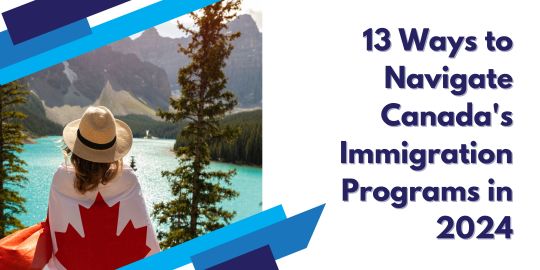
Canada remains one of the most desirable destinations for immigrants seeking new opportunities and a better quality of life. With various Canada Immigration Programs available, navigating the process can feel overwhelming. However, fear not! Here are 13 simplified ways you can explore Canada's immigration programs in 2024:
Express Entry: This is like the VIP line for skilled workers. If you have valuable skills and work experience, you can apply through Express Entry to become a permanent resident.
Provincial Nominee Program (PNP): Each province in Canada has its own immigration program tailored to its specific needs. Research which province suits you best and apply through their PNP.
Family Sponsorship: If you have family members who are Canadian citizens or permanent residents, they may be able to sponsor you to come to Canada.
Study Permit: Planning to study in Canada? Apply for a study permit. After completing your studies, you might be eligible for a post-graduation work permit or even permanent residency.
Work Permit: If you have a job offer from a Canadian employer, you can apply for a work permit. Gain Canadian work experience, and it might open doors to permanent residency.
Caregiver Program: If you have experience caring for children, elderly, or people with medical needs, you might qualify for the caregiver program.
Start-up Visa: Got a great business idea? Canada welcomes entrepreneurs through the Start-up Visa program. Get support for your business and your immigration journey.
Atlantic Immigration Pilot: Interested in working and living in Atlantic Canada? This pilot program connects skilled workers with employers in the Atlantic provinces.
Rural and Northern Immigration Pilot: Similar to the Atlantic Immigration Pilot, this program aims to attract immigrants to rural and northern communities across Canada.
Global Talent Stream: If you're a highly skilled worker in certain fields like technology, you might be eligible for expedited processing through the Global Talent Stream.
Self-Employed Persons Program: Artists, athletes, and farmers, rejoice! This program is designed for self-employed individuals who can contribute to Canada's cultural or athletic scene or agricultural industry.
Refugee Resettlement: Canada is committed to helping refugees rebuild their lives. If you're a refugee in need of resettlement, explore Canada's refugee programs.
Humanitarian and Compassionate Grounds: If you're already in Canada and facing exceptional circumstances that prevent you from returning to your home country, you can apply for permanent residency on humanitarian and compassionate grounds.
Remember, each Canada Immigration Programs has its own eligibility criteria and application process. It's essential to research thoroughly and consult with immigration professionals if needed. With determination and the right guidance, you can embark on your journey to Canada in 2024!
0 notes